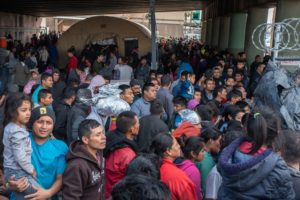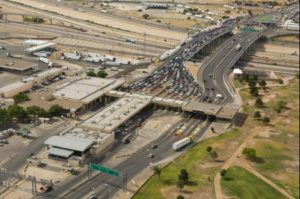 This week, we have a guest-writer for Jesus-Justice-Joy. We are so grateful that immigration attorney with Las Americas Immigrant Advocacy Center, Maryknoll Lay Missioner, and Shannon’s cousin, Heidi Cerneka, has graciously agreed to share a few thoughts from her experiences working with migrant people in El Paso, Texas.
This week, we have a guest-writer for Jesus-Justice-Joy. We are so grateful that immigration attorney with Las Americas Immigrant Advocacy Center, Maryknoll Lay Missioner, and Shannon’s cousin, Heidi Cerneka, has graciously agreed to share a few thoughts from her experiences working with migrant people in El Paso, Texas.
I am Shannon Cerneka’s cousin, currently working as an immigration attorney in El Paso, Texas through Maryknoll Lay Missioners (www.mklm.org). Shannon asked me to share a bit about my work.
El Paso, Texas shares a border with Chihuahua, Mexico and Las Cruces, Arizona. It is a city of amazing people and amazing solidarity, and it is NOT being overrun by criminals or diseased people or even migrants. However, we do meet many people who are seeking asylum in the United States. Below, I will give a simple lesson on solidarity, immigration, and asylum.
El Paso Hospitality and Solidarity
Every day, hundreds of asylum-seeking migrants are released by ICE (Immigration and Customs Enforcement) into El Paso. An amazing network of hospitality centers receives them. The hospitality centers offer beds, meals, showers, basic first aid, hugs, warmth, and assistance in contacting sponsors who will host them while they are pursuing their asylum cases. The sponsor is responsible for purchasing the migrant’s bus or plane ticket to his/her destination. The next day, the center transports people to the bus station or airport with a snack bag for the journey. Volunteers do ALL of this- cleaning, cooking, washing, phone-calling, as well as collecting and distributing supplies and clothing donations. The generosity, kindness, and solidarity are beyond amazing. Whenever there is a last minute emergency call for more help, people always respond. Many of the volunteers come from faith communities and are motivated by their belief in a God of love and a God of justice.

(photo credit: Sergio Flores for The Washington Post)
IMMIGRATION 101
Here is a simple overview of asylum as part of immigration:
- Requesting asylum is a right guaranteed by the United Nations Convention relating to the Status of Refugees (signed and ratified by the U.S.) and by U.S. law
- The people who are released by ICE are not here illegally nor are they “undocumented” (once they request asylum and are released from detention to pursue their asylum case, they have legal documents)
- All the people released at the border still have to go through the rigorous asylum application process.
- A refugee is a person who has been forced to flee her/his country of origin because of persecution, war or violence. In order to gain asylum in the U.S., a person must demonstrate
- A well-founded fear of persecution because of race/ethnicity, religion, nationality, political opinion, or membership in a “particular social group” (the most complicated category)
- That she/he cannot return to his or her country or is afraid to return
- That the State is either the perpetrator or is unable or unwilling to control the perpetrator
- To even be considered for asylum, a person must pass an interview demonstrating a credible fear of persecution under the above requirements. They must meet other requirements like background checks and verification of prior entrances into the U.S., etc. IF they get through this hoop, then they can begin the actual asylum process. In Texas, judges grant only 3% of asylum claims. We have very credible and serious cases of persecution and violence that are denied here, cases that would have a better chance at a fair hearing outside of Texas. =(

photo credit: James Tourtellotte/U.S. Customs and Border Protection
Immigration Situation in El Paso — THE WRONG QUESTIONS
We are arguing about the wrong questions here. We should not be talking about building walls and more detention facilities. If we get to the root of it all, can’t we agree that every human being deserves a life of dignity and abundance, food, safety, health, and education?
Central Americans are fleeing violence, poverty, hunger, corruption and State involvement in the violence. U.S. intervention for economic and military purposes has contributed to much of the violence and injustice. We have a responsibility as a nation to make reparations. We have a responsibility as human beings to work for a more just and fair world, and we are responsible as people of faith to welcome our neighbor with love and hospitality. I’ll keep working on recommendations for viable solutions, but I can unequivocally say that the following are NOT viable responses:
- Imprisoning people who have not committed any crime, and have credible asylum claims
- Separating parents or grandparents or adult siblings from children
- Leaving people sleeping on concrete under a bridge with no water, showers and only sandwiches for days
- closing the border
A fair and updated immigration law would be a good start. As would helping the countries of origin of many immigrants in a way that gets the aid and resources to the people and creates jobs. Let’s make farming a fair-trade industry; let’s commit to living wages for workers in U.S. owned or based industries located in other countries. Of course, that means that our favorite discount stores will be charging higher prices. But do I really want to buy cheap clothing because someone else is getting paid $3/day?
